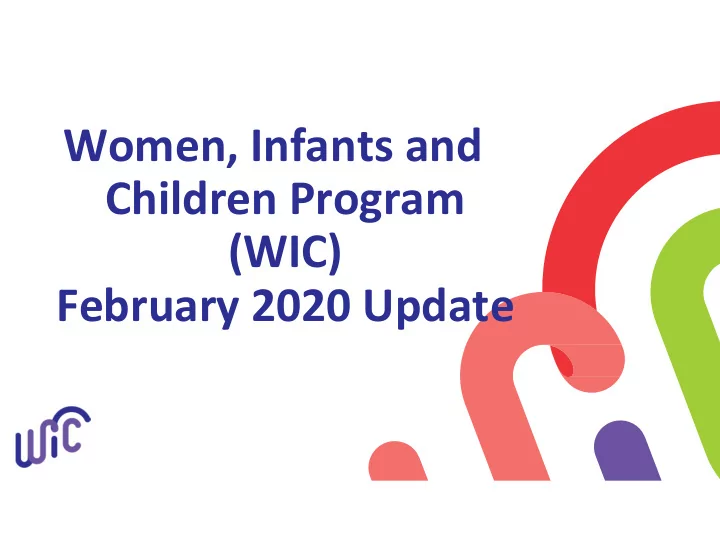

Women, Infants and Children Program (WIC) February 2020 Update
Participation
Monthly Participation Trend by State Fiscal Year, NC WIC 260,000 250,000 240,000 230,000 220,000 210,000 200,000 190,000 180,000 Jul Aug Sep Oct Nov Dec Jan Feb Mar Apr May Jun 2016 2017 2018 2019 2020 SFY Jul Aug Sep Oct Nov Dec Jan Feb Mar Apr May Jun Average 2016 251,398 250,190 250,433 249,255 245,698 243,284 241,610 238,871 238,703 237,076 238,414 238,728 243,638 2017 237,788 239,929 238,929 236,682 232,748 228,252 231,752 229,538 230,193 225,829 228,170 228,958 232,397 2018 228,578 230,390 229,767 230,184 226,683 219,966 220,992 218,437 218,318 217,603 219,239 218,682 223,237 2019 218,508 222,582 222,901 212,394 208,298 202,573 202,668 200,138 201,512 201,538 205,038 206,205 208,696 2020 209,511 216,957 214,630 213,394 210,377 212,974
Last Five ‐ Months’ WIC Participation 216,957 214,630 213,394 210,377 209,511 Jul ‐ 19 Aug ‐ 19 Sep ‐ 19 Oct ‐ 19 Nov ‐ 19
Potential WIC Eligible Population
Summary NC Participation to Enrollment
October 2019 County ‐ Specific Participation to Enrollment Rate
Where are we going? Goal of at least 8% sustained increase over April 2019 participation by March 2020 Goal of 50% of potentially eligible pregnant women participate in WIC by December 2020 Goal of at least 2% increase of children coverage rate from 40.7%
National Barriers to WIC Participation – FRAC Study
NC Barriers to Participation – Survey Feedback • Broad feedback consistent with national identified barriers • Surveyed participants who missed appointments for feedback • Utilized this opportunity to identify barriers to best serve families and to justify remote issuance if warranted
Funding
FFY 2020 • Domestic Discretionary Program (not Entitlement) • From Congress USDA States Local Agencies. Funding formula driven primarily based on participation. • Expect food budget to be adequate for FY 20. • NSA Challenges: • Participation, Participation, Participation • Working off of CRs for 4 ‐ 6 months after the start of a FFY. • LA allocations – participation aged up to 11 mo. Prior to new SFY • Reallocations ‐ Recovered funding pool likely declining • Balancing the “Performance Penalty” • Lapsed funds
FFY 2020 NSA Funding • Projections, projections, projections • FFY 2020 budget: • The initial budget is $9m lower than where we ended last year. • Still many unknowns (ie. Administrative Grant per Participant) • Possibility of operational adjustment funds and reallocations • RISK: • Continue growing participation so that we can “earn” additional funding and avoid a performance penalty.
Best Practices as Report By Local Agencies • Following up on missed appointments by working reports • Mobile clinics and/or satellite sites (Head Start, SNAP, etc.) • Offering on ‐ line Nutrition Education Training ‐ WIChealth.org • Offering child friendly clinic space • Positive client experience/customer ‐ oriented service • Outreach (Daycares, Ob ‐ Gyn offices, etc.) • Offer non ‐ traditional office hours • Implement use of the “Customer Service Skills Assessment”
• People-focused • Teamwork WIC • Proactive Communication Reimagined • Transparency • Stewardship
Reimagining WIC • Technology: • Apply for Tuft’s Telehealth grant • Implemented one ‐ way texting; two ‐ way is being developed • GIS mapping of participant clusters • Customer service • Vendor Summits in June • Online referrals • Report Cards to LHDs
Reimagining WIC cont. • Communication: • Monthly communication • Regional meetings quarterly with peers • Data ‐ driven decision making: • Pregnant women • Children • Measuring and evaluating performance: • Client Satisfaction Surveys, research groups, and report cards
Summary • State office will continue working with USDA to address funding concerns • Continue growing participation by strategically prioritizing activities • This is a fluid situation and current numbers are preliminary: • Often start the year with reduced funding that we recoup through reallocations. • Concern: decreased participation = less opportunity for budget exp. without risking penalties; likely less reallocation funding • Work to fill or backfill positions to ensure that staff are in place to grow participation • Our top priority in July (as funding permits) ‐ fund agencies reduced that are now serving their prior base caseload OR exceeding 100%
Questions?
Non ‐ Discrimination Statement In accordance with Federal civil rights law and U.S. Department of Agriculture (USDA) civil rights regulations and policies, the USDA, its Agencies, offices, and employees, and institutions participating in or administering USDA programs are prohibited from discriminating based on race, color, national origin, sex, disability, age, or reprisal or retaliation for prior civil rights activity in any program or activity conducted or funded by USDA. Persons with disabilities who require alternative means of communication for program information (e.g. Braille, large print, audiotape, American Sign Language, etc.), should contact the Agency (State or local) where they applied for benefits. Individuals who are deaf, hard of hearing or have speech disabilities may contact USDA through the Federal Relay Service at (800) 877 ‐ 8339. Additionally, program information may be made available in languages other than English. To file a program complaint of discrimination, complete the USDA Program Discrimination Complaint Form, (AD ‐ 3027) found online at: http://www.ascr.usda.gov/complaint_filing_cust.html, and at any USDA office, or write a letter addressed to USDA and provide in the letter all of the information requested in the form. To request a copy of the complaint form, call (866) 632 ‐ 9992. Submit your completed form or letter to USDA by: Mail : U.S. Department of Agriculture Office of the Assistant Secretary for Civil Rights 1400 Independence Avenue, SW Washington, D.C. 20250 ‐ 9410 Fax : (202) 690 ‐ 7442; or Email : program.intake@usda.gov This institution is an equal opportunity provider.
Thank You!
Recommend
More recommend